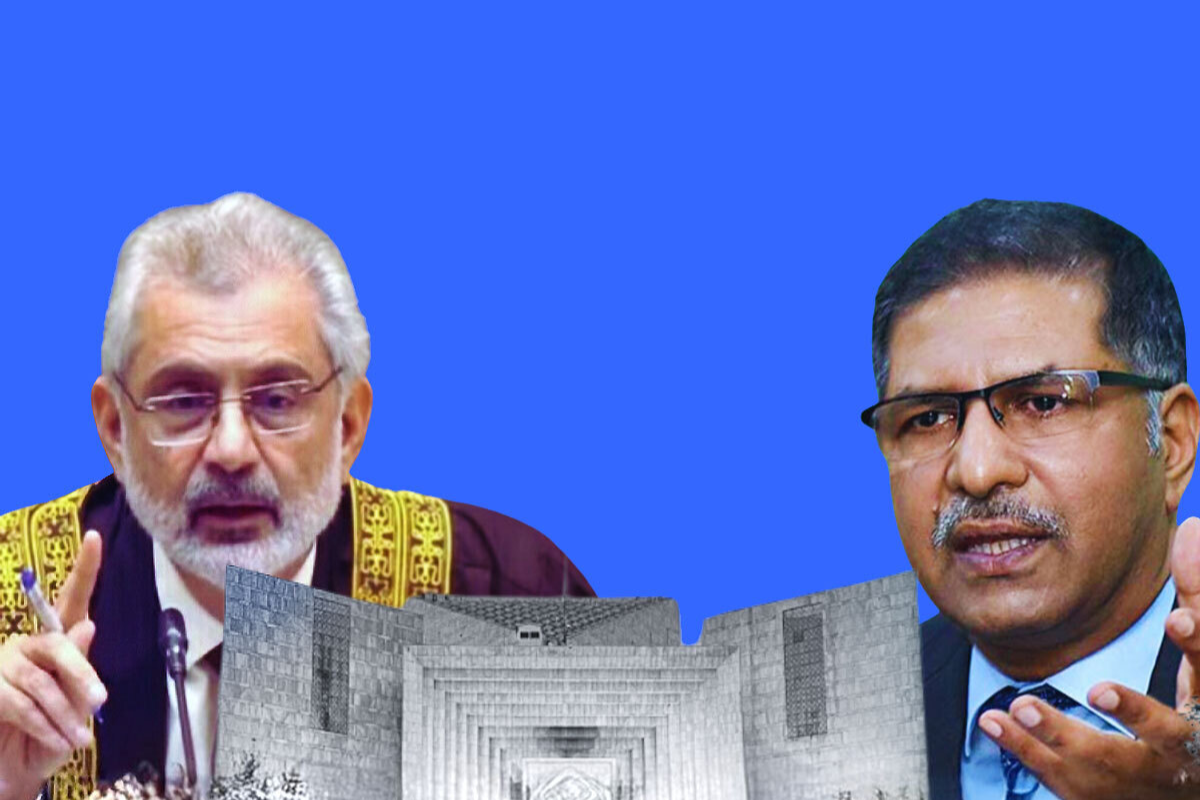'You are crossing a line', Pakistan's top judge tells opposition party's lawyer
Much to the government's relief, Pakistan's top court strikes down 2022 ruling on defection law

Aamir Abbasi
Editor, Islamabad
Aamir; a journalist with 15 years of experience, working in Newspaper, TV and Digital Media. Worked in Field, covered Big Legal Constitutional and Political Events in Pakistan since 2009 with Pakistan’s Top Media Organizations. Graduate of Quaid I Azam University Islamabad.

Tensions rose between apex court bench and PTI's legal representative after he argued that govt's judicial reforms and constitutional amendments could promote horse trading
In a major win for the government, Pakistan’s Supreme Court on Thursday nullified its previous bench’s interpretation of Article 63A, with a unanimous 5-0 ruling.
The review petition is seen as crucial for the government in its attempts to pass constitutional amendments that would impact the court's functions. The opposition has vehemently protested the proposed amendments and termed them an 'attack on judicial independence'.
The case centers on the Supreme Court’s May 17, 2022 ruling on a presidential reference concerning Article 63-A, which stated that votes cast by defecting lawmakers against party policy would not be counted.
Former president Dr Arif Alvi filed the reference during the tenure of jailed ex-prime minister Imran Khan's government.
The judgment also left the duration of disqualification up to the discretion of parliament. This 3-2 verdict, led by then-Chief Justice Umar Ata Bandial, saw Justices Mazhar Alam Miankhel and Jamal Khan Mandokhail dissenting.
A day earlier, Pakistan’s top judge rejected opposition party Pakistan Tehreek-e-Insaf's (PTI) objection over the formation of the bench hearing the Article 63-A case on defecting lawmakers.
This development came a day after a judge from the Supreme Court declined to join the five-member bench hearing the review petition. However, the hearing continued on Tuesday after Chief Justice Qazi Faez Isa appointed another judge.
Justice Munib Akhtar recused himself from sitting on the bench due to multiple concerns. In a letter, he disputed the judges’ committee that formed the bench. He also disagreed with the inclusion in the bench of an ad hoc judge - Justice Mazhar Alam Khan Miankhel.
The new five-member bench included Chief Justice Qazi Faez Isa, justices Amin-ud-Din Khan, Jamal Mandokhail, Naeem Akhtar Afghan, and Justice Miankhel.
Today’s hearing
The bench, led by Chief Justice of Pakistan (CJP) Qazi Faez Isa, began hearing the review petition on Article 63A.
The PTI's legal representative, Ali Zafar, informed the court that party founder Imran Khan instructed him not to participate in proceedings before the current bench. Zafar further conveyed that Imran Khan wished to address the court directly via video link.
Despite this, CJP Isa directed Zafar to proceed with his arguments. Zafar, however, remained firm, insisting, "I will present my arguments after the chairman has made his submissions."
The tension escalated when Zafar argued that the government's judicial reforms and constitutional amendments could encourage horse trading. CJP Isa responded sternly, warning Zafar, "You are crossing a line now. We can issue a contempt of court notice against you."
Justice Jamal Mandokhail also rebuked Zafar, questioning, "How can you say we are allowing horse trading?"
The proceedings took a confrontational turn when Zafar hinted at his withdrawal, stating, "I will be out of this courtroom in seven more minutes," to which CJP Isa quipped, "Very good, that’s what we want too."
During the hearing, the discussion revolved around the authority of party leaders in declaring defections and how far the judiciary can intervene.
Zafar contended that the apex court had wrongfully linked a presidential reference on defections to the constitutional petitions on the no-confidence motion. He claimed that the earlier decision had granted undue power to party leaders over individual members of parliament.
The top judge questioned the court’s role in determining defections, asserting, "Who is a judge to declare whether a member has defected?" He emphasized that the power to issue a defection declaration lies solely with the party leader.
Justice Aminuddin Khan inquired about the election of parliamentary leaders, and Zafar explained that these leaders are chosen by parliamentary members. Justice Jamal Mandokhail further noted that voting is an individual right, asking how it could be solely the right of a political party.
CJP Isa compared voting against a party’s direction to a "suicide attack", as the vote would lead to disqualification. He emphasized that judges must remain within their constitutional limits, adding, "No judge can take an oath and say they disagree with a certain clause of the Constitution."
Justice Isa also criticized the long-standing culture of judicial overreach and warned against turning political figures into "rubber stamps". He urged political parties to manage their affairs internally rather than relying on the courts for decisions on defections.







Comments
See what people are discussing